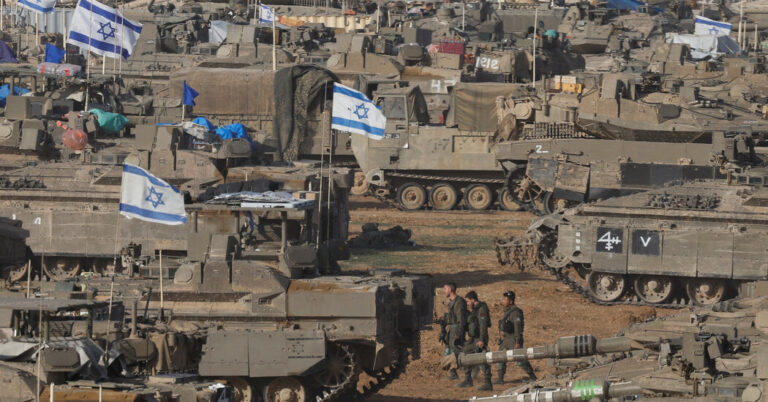President Biden’s warning The cutoff in arms supplies has tightened the bind facing Israeli Prime Minister Benjamin Netanyahu, as he is increasingly caught between international calls for a ceasefire and Israeli demands for right to carry out a large-scale invasion of Rafah, in southern Gaza. .
Mr Netanyahu, who insisted over US objections on the need to invade Rafah, now finds himself in the US-Israeli relationship at a moment of crisis that could affect how he wages the next phase of the war against Hamas .
On Thursday, the Israeli leader, referring to Mr. Biden’s comments, said in a statement: “If we must be alone, we will be alone. I said that, if necessary, we will fight with our nails. But we have more than nails and with this same strength of spirit, with God’s help, together we will overcome.
As Mr Biden threatens for the first time to withhold more US weapons, including heavy bombs and artillery shells, if Israel carries out a major operation in Rafah, a city populated by around a million Palestinians, Analysts say the Israeli military is at risk of losing power. support of its largest supplier of foreign arms.
“The United States is providing Israel with a steel dome – it’s not just military support; it is strategic and political; it is at the United Nations, the International Court, etc. said Amos Gilead, a former senior Israeli defense official who worked closely with U.S. security officials for decades.
“If we lose the United States thanks to the incredible friendship of President Biden, it will not be forgiven,” he added.
But Rear Admiral Daniel Hagari, an Israeli military spokesman, said Thursday that the army had enough “ammunition for its planned operations, including operations in Rafah.”
While Israel has enough weapons in its stockpile to carry out a full-scale invasion of Gaza City, US restrictions could force the Israeli military to reduce the deployment of specific munitions, experts said.
“It’s possible that we need to economize on how we use our weapons and hit more targets without precision bombs,” said Jacob Nagel, a former national security adviser.
Avi Dadon, a former head of procurement at the Israeli Defense Ministry, told Kan, Israel’s public television channel, that he “might be worried” if he was denied American weapons. But on the surface, at least, key members of Mr. Netanyahu’s government said the war effort would not be affected.
“I turn to Israel’s enemies as well as our best friends and say: The State of Israel cannot be subjugated,” Defense Minister Yoav Gallant said at a memorial ceremony, adding that the country would do “whatever is necessary” to defend its country. citizens and “to stand up to those who try to destroy us”.
Bezalel Smotrich, the far-right finance minister, said Israel would achieve a “complete victory” despite what he described as Mr Biden’s “pushback and arms embargo”.
American-made weapons, including heavy bombs, have been essential to Israel’s war effort since the country was attacked by Hamas and other militant groups on October 7. But Mr. Biden is under growing domestic pressure to rein in the Israeli military as the death toll has risen in Gaza. There are now more than 34,000, according to local health authorities.
And in his comments Wednesday in an interview with CNN, Mr. Biden acknowledged for the first time that U.S. bombs had killed innocent civilians in the conflict.
American concerns have only grown since the Israeli army sent tanks and troops into the eastern part of Rafah on Monday evening, taking control of the main border crossing between Gaza and Egypt. Israeli forces have not entered built-up areas of the city, but Mr. Netanyahu and others have signaled that such an operation was necessary to eliminate Hamas battalions there.
On Tuesday, US officials said Mr. Biden had retained 1,800 2,000-pound bombs and 1,700 500-pound bombs. which he feared could be dropped on Rafah. The administration is considering whether to pause future transfers, including guidance kits to convert so-called dumb bombs into precision-guided munitions, the officials said.
In addition to bombs, Mr. Biden said the United States would not provide artillery shells if Israel invaded the Rafah population centers.
Gilad Erdan, Israel’s ambassador to the United Nations, called the Biden administration’s decision “very disappointing” and “frustrating.”
“We have a cruel enemy here,” he said. “Is this the time to impose restrictions on Israel’s weapons?
Nadav Eyal, a prominent columnist for a centrist Israeli newspaper, said Mr. Biden had essentially decided to declare an end to the war. Writing on the social media platform X, he called it “the most serious clash between a US administration and the Israeli government since the First Lebanon War.”
Israeli Ambassador to Washington Michael Herzog said Thursday that Mr. Biden’s decision “sends the wrong message to Hamas and our enemies in the region.”
“This puts us in a bind,” he said during a public conversation hosted by the Carnegie Endowment for International Peace in Washington. He added: “No one has presented me or us with a strategy to defeat Hamas without dealing with Rafah. »
Some analysts, however, downplayed the significance of the crisis, arguing that it was not as serious as past fissures between the United States and Israel. The breakdown in relations over the Iran nuclear deal in 2016 was “much worse,” Mr. Nagel said.
Amid the tense situation, Israeli President Isaac Herzog thanked the United States for its support of Israel and appeared to attack Itamar Ben-Gvir, the Minister of National Security, who had posted on , “Hamas ♥ Biden”.
“Even when there are disagreements and moments of disappointment among friends and allies, there is a way to clarify differences,” Mr. Herzog said.
Myra Noveck, Michael Crowley And John Reiss reports contributed.


